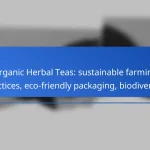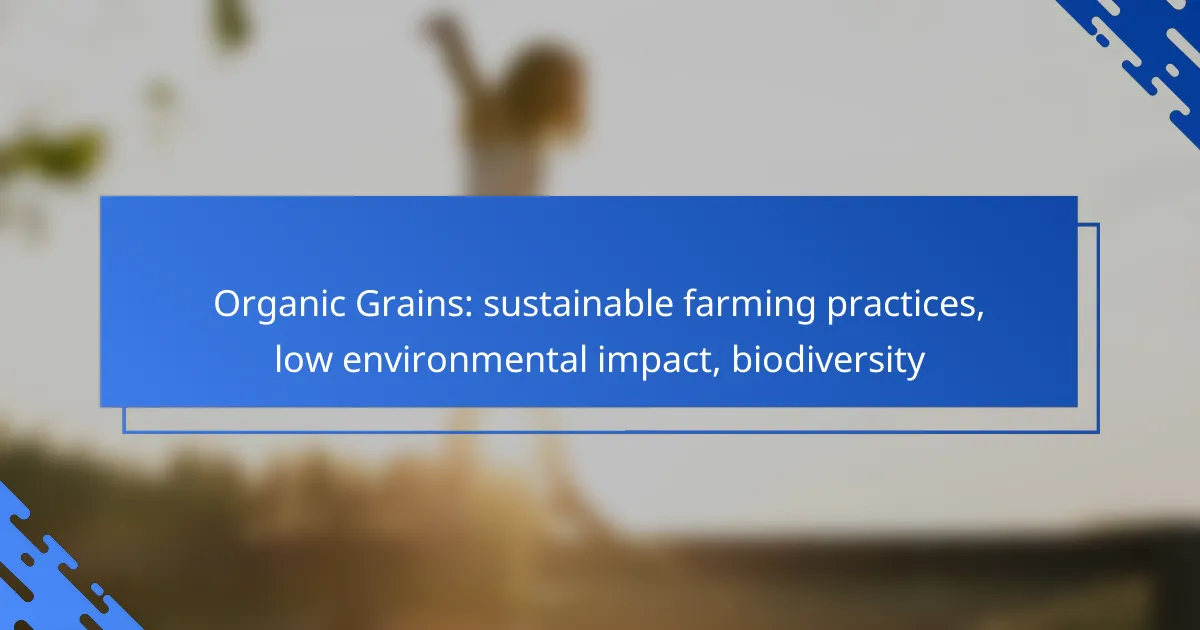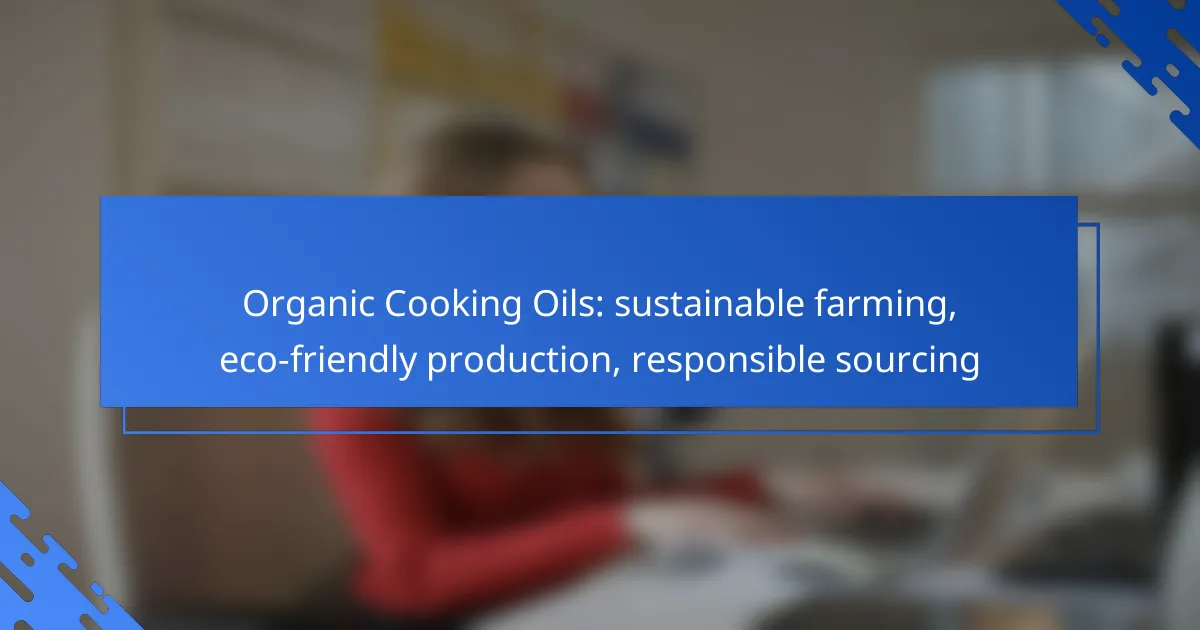Organic spices are cultivated through ethical sourcing practices that emphasize fair treatment of farmers and sustainable agriculture. By prioritizing minimal processing, these spices retain their natural flavors and nutrients, ensuring a high-quality product that benefits both consumers and the environment.

How are organic spices ethically sourced?
Organic spices are ethically sourced through practices that prioritize fair treatment of farmers, sustainable agriculture, and transparency in the supply chain. This approach ensures that producers receive fair compensation while promoting environmentally friendly farming methods.
Fair Trade certification
Fair Trade certification guarantees that farmers receive a fair price for their products, which helps improve their living standards. This certification often includes a premium that can be invested in community projects, such as education and healthcare. Look for labels that indicate Fair Trade status to ensure your spices support ethical practices.
Direct farmer partnerships
Establishing direct partnerships with farmers allows companies to bypass intermediaries, ensuring that a larger share of the profits goes directly to the producers. This model fosters long-term relationships, promoting sustainable farming practices and enhancing the quality of the spices. Consumers can seek brands that highlight these partnerships to support ethical sourcing.
Transparency in supply chains
Transparency in supply chains involves clear communication about where and how spices are sourced. Companies that prioritize transparency often provide detailed information about their sourcing practices, including the origins of their spices and the conditions under which they are produced. Consumers should look for brands that openly share this information to make informed purchasing decisions.

What are the benefits of sustainable farming for spices?
Sustainable farming for spices offers numerous benefits, including enhanced environmental health and improved product quality. By focusing on practices that are ecologically sound, farmers can produce spices that are not only better for the planet but also more flavorful and nutritious.
Soil health improvement
Sustainable farming practices enhance soil health by promoting biodiversity and reducing erosion. Techniques such as crop rotation, cover cropping, and organic amendments help maintain nutrient levels and structure in the soil, leading to more resilient ecosystems.
Healthy soil supports better water retention and reduces the need for irrigation, which is particularly beneficial in regions prone to drought. Farmers can improve soil health over time, creating a sustainable cycle that benefits future crops.
Reduction of chemical use
By adopting sustainable farming methods, spice growers can significantly reduce their reliance on synthetic fertilizers and pesticides. Organic practices often utilize natural alternatives, such as compost and beneficial insects, to manage pests and nourish plants.
This reduction in chemical use not only leads to safer food products but also minimizes environmental contamination. Consumers increasingly prefer organic spices, which can command higher prices in the market, benefiting farmers economically.
Support for local ecosystems
Sustainable farming supports local ecosystems by preserving habitats and promoting biodiversity. By avoiding monoculture practices, farmers can create environments that nurture a variety of plants and wildlife, which in turn helps pollinate crops and control pests naturally.
Additionally, sustainable practices can help mitigate climate change effects by sequestering carbon in the soil. This holistic approach benefits not just the farm but the surrounding community and environment, fostering a healthier ecosystem overall.

How does minimal processing affect organic spices?
Minimal processing enhances the quality of organic spices by preserving their natural characteristics. This approach limits alterations to the spices, ensuring that they maintain their original flavor, nutrients, and environmental benefits.
Preservation of flavor
Minimal processing helps retain the authentic flavor profiles of organic spices. Techniques such as air drying or cold pressing avoid the use of high heat, which can diminish the essential oils responsible for taste. As a result, spices like turmeric or cumin maintain their robust flavors, enhancing culinary dishes more effectively.
When selecting organic spices, look for those labeled with minimal processing methods. This can often be indicated on packaging, helping you choose products that deliver the most intense flavors.
Retention of nutrients
Organic spices undergo minimal processing to preserve their nutritional content. High temperatures and extensive processing can lead to the degradation of vitamins and antioxidants found in spices. For example, fresh ginger retains more beneficial compounds when dried naturally rather than through industrial methods.
To maximize nutrient retention, consider purchasing whole spices and grinding them as needed. This practice not only ensures freshness but also enhances the nutritional benefits of your meals.
Lower environmental impact
Minimal processing of organic spices typically results in a lower environmental footprint. By reducing energy consumption associated with high-heat processing and extensive packaging, these methods contribute to sustainability. For instance, air-dried spices require less energy than those processed with industrial machinery.
When choosing organic spices, look for brands that emphasize sustainable practices. Certifications like USDA Organic or Fair Trade can indicate a commitment to environmentally friendly sourcing and processing methods.

What are the best practices for sourcing organic spices?
The best practices for sourcing organic spices include researching suppliers, evaluating their certifications, and understanding local farming practices. These steps ensure that the spices are ethically sourced, sustainably farmed, and minimally processed, aligning with organic standards.
Researching suppliers
Start by identifying suppliers who specialize in organic spices. Look for companies that have a transparent supply chain and provide information about their sourcing methods. Online reviews and industry recommendations can also help gauge the reliability and ethical practices of potential suppliers.
Consider reaching out directly to suppliers for more detailed information about their farming partners and sourcing locations. This direct communication can reveal their commitment to ethical practices and sustainability.
Evaluating certifications
Check for recognized organic certifications such as USDA Organic or EU Organic. These certifications indicate compliance with strict agricultural standards, ensuring that the spices are grown without synthetic pesticides or fertilizers.
In addition to organic certifications, look for fair trade or sustainability certifications that demonstrate a commitment to ethical labor practices. This can provide further assurance that the spices are sourced responsibly.
Understanding local farming practices
Familiarize yourself with the farming practices in the regions where the spices are sourced. Sustainable farming methods, such as crop rotation and organic pest management, contribute to the health of the ecosystem and the quality of the spices.
Engage with local farmers or cooperatives to learn about their cultivation techniques and challenges. This knowledge can help you make informed decisions about which suppliers align with your values regarding sustainability and ethical sourcing.

How can consumers identify high-quality organic spices?
Consumers can identify high-quality organic spices by examining product labels, checking for reputable certifications, and seeking out trusted brands. These steps ensure that the spices are ethically sourced, sustainably farmed, and minimally processed.
Reading labels
Reading labels is crucial for identifying high-quality organic spices. Look for terms like “100% organic” or “certified organic,” which indicate adherence to organic farming standards. Additionally, check for information on the origin of the spices, as locally sourced products often support sustainable practices.
Be wary of vague terms such as “natural” or “pure,” as these do not guarantee organic quality. Ingredients should be listed clearly, with no artificial additives or preservatives.
Checking for certifications
Certifications are a reliable indicator of organic quality. In the United States, look for the USDA Organic seal, which signifies compliance with strict organic farming regulations. In Europe, the EU Organic logo serves a similar purpose.
Other certifications, such as Fair Trade or Non-GMO Project Verified, can also indicate ethical sourcing and sustainable practices. Always verify that the certification is from a reputable organization to ensure its validity.
Seeking out reputable brands
Choosing reputable brands is essential for ensuring the quality of organic spices. Research brands that prioritize ethical sourcing and sustainable farming practices. Customer reviews and brand transparency regarding sourcing can provide valuable insights.
Consider brands that are well-known in the organic market and have a history of positive consumer feedback. Avoid brands that do not provide clear information about their sourcing and processing methods, as this may indicate lower quality products.

What are the emerging trends in organic spice sourcing?
Emerging trends in organic spice sourcing focus on ethical practices, sustainability, and minimal processing. These trends reflect a growing consumer demand for transparency and quality in food production.
Increased demand for traceability
Consumers are increasingly seeking information about the origins of their spices, leading to a heightened demand for traceability. This trend encourages producers to provide detailed information about the sourcing and processing of spices, ensuring that they meet ethical and organic standards.
To meet this demand, many companies are adopting blockchain technology and other tracking systems to verify the journey of spices from farm to table. This not only builds consumer trust but also helps in maintaining quality control throughout the supply chain.
Growth of urban farming initiatives
Urban farming initiatives are gaining traction as cities look to enhance local food production, including organic spices. These initiatives often utilize small spaces, such as rooftops and community gardens, to grow spices sustainably and reduce transportation emissions.
Support for urban farming can come from local governments and community organizations, which may provide funding or resources. This trend not only promotes sustainability but also fosters community engagement and education about organic farming practices.
Integration of technology in farming
The integration of technology in farming is transforming the organic spice industry by improving efficiency and sustainability. Precision agriculture tools, such as soil sensors and drones, help farmers monitor crop health and optimize resource use.
Farmers can leverage data analytics to make informed decisions about planting, irrigation, and pest management, ultimately enhancing yield while minimizing environmental impact. As technology continues to evolve, it will play a crucial role in shaping the future of organic spice sourcing.










